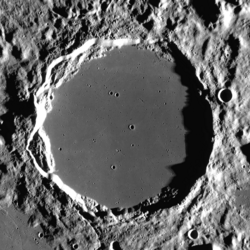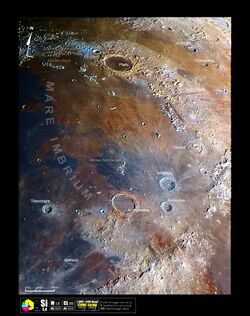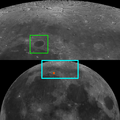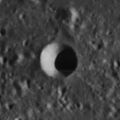Astronomy:Plato (crater)
 | |
| Diameter | 101 km (63 mi)[1] |
|---|---|
| Depth | 1,468 m (4,816 ft)[2] |
| Colongitude | 9° at sunrise |
Plato is a lava-filled lunar impact crater on the Moon. Its diameter is 101 km. It was named after ancient Greek philosopher Plato.[1] It is located on the northeastern shore of the Mare Imbrium, at the western extremity of the Montes Alpes mountain range. In the mare to the south are several rises collectively named the Montes Teneriffe. To the north lies the wide stretch of the Mare Frigoris. East of the crater, among the Montes Alpes, are several rilles collectively named the Rimae Plato.

The age of Plato is about 3.84 billion years, only slightly younger than the Mare Imbrium to the south. The rim is irregular with 2-km-tall jagged peaks that project prominent shadows across the crater floor when the Sun is at a low angle. Sections of the inner wall display signs of past slumping, most notably a large triangular slide along the western side. The rim of Plato is circular, but from the Earth it appears oval due to foreshortening.
The flat floor of Plato has a relatively low albedo, making it appear dark in comparison to the surrounding rugged terrain. The floor is free of significant impact craters and lacks a central peak. However, there are a few small craterlets scattered across the floor.
Plato is one of the largest craters of Upper (Late) Imbrian age.[3]
Plato has developed a reputation for transient lunar phenomena, including flashes of light, unusual colour patterns, and areas of hazy visibility. These anomalies are likely a result of seeing conditions, combined with the effects of different illumination angles of the Sun.
Gallery
Imbrium map.png Detail map of Mare Imbrium's features. Plato is the feature marked "C".
Lunar crater Plato.png Location of Plato from Clementine images
Moon-crater-Plato-nov10-2005.png Plato (center) in a telescopic photograph (viewed from the earth)
Plato Crater.jpg Plato (viewed from the earth)
Mare Frigoris.jpg Photo of Mare Frigoris. Plato is the dark circular feature to the south of the mare.
Plato (crater) Cross Section.png Plato as taken from Lunar Reconnaissance Orbiter data, inset graph shows elevations of green line, left to right.
Satellite craters
By convention these features are identified on lunar maps by placing the letter on the side of the crater midpoint that is closest to Plato.
| Plato | Latitude | Longitude | Diameter |
|---|---|---|---|
| B | 53.0° N | 17.2° W | 13 km |
| C | 53.2° N | 19.4° W | 10 km |
| D | 49.6° N | 14.5° W | 10 km |
| E | 49.7° N | 16.2° W | 7 km |
| F | 51.7° N | 17.4° W | 7 km |
| G | 52.1° N | 6.3° W | 8 km |
| H | 55.1° N | 2.0° W | 11 km |
| J | 49.0° N | 4.6° W | 8 km |
| K | 46.8° N | 3.3° W | 6 km |
| KA | 46.8° N | 3.6° W | 6 km |
| L | 51.6° N | 4.3° W | 10 km |
| M | 53.1° N | 15.4° W | 8 km |
| O | 52.3° N | 15.4° W | 9 km |
| P | 51.5° N | 15.2° W | 8 km |
| Q | 54.5° N | 4.8° W | 8 km |
| R | 53.8° N | 18.3° W | 6 km |
| S | 53.8° N | 14.9° W | 6 km |
| T | 54.5° N | 11.2° W | 8 km |
| U | 49.6° N | 7.4° W | 6 km |
| V | 55.8° N | 7.4° W | 6 km |
| W | 57.2° N | 17.8° W | 4 km |
| X | 50.1° N | 13.8° W | 5 km |
| Y | 53.1° N | 16.3° W | 10 km |
The following craters have been renamed by the IAU:
- Plato A — See Bliss (crater).
Plato in fiction
The crater Plato is the location of an observatory in Arthur C. Clarke's novel Earthlight (1955), of the lunar "warren" Hong Kong Luna in Robert A. Heinlein's novel The Moon Is a Harsh Mistress (1966), and of Moonbase Alpha in the science-fiction TV series Space: 1999.
Crater Plato is the home crater of Matthew Looney and Maria Looney, protagonists of the Looney series of children's books set on the Moon, written by Jerome Beatty.
References
- ↑ 1.0 1.1 "Plato (crater)". Gazetteer of Planetary Nomenclature. USGS Astrogeology Research Program.
- ↑ "A cross section line trace of the lunar crater Plato, with an elevation graph of the line inset, from Lunar Reconnaissance Orbiter data". October 2, 2016. http://target.lroc.asu.edu/q3/.
- ↑ The geologic history of the Moon. USGS Professional Paper 1348. By Don E. Wilhelms, John F. McCauley, and Newell J. Trask. U.S. Government Printing Office, Washington: 1987. Table 11.2.
- Andersson, Leif E.; Whitaker, Ewen A. (1982). NASA Catalogue of Lunar Nomenclature. NASA RP-1097. https://ntrs.nasa.gov/archive/nasa/casi.ntrs.nasa.gov/19830003761.pdf.
- Blue, Jennifer (July 25, 2007). "Gazetteer of Planetary Nomenclature: The Moon". USGS. https://planetarynames.wr.usgs.gov/Page/MOON/target.
- Bussey, Ben; Spudis, Paul (2004). The Clementine Atlas of the Moon. New York: Cambridge University Press. ISBN 978-0-521-81528-4.
- Cocks, Elijah E.; Cocks, Josiah C. (1995). Who's Who on the Moon: A Biographical Dictionary of Lunar Nomenclature. Tudor Publishers. ISBN 978-0-936389-27-1. https://archive.org/details/isbn_9780936389271.
- McDowell, Jonathan (July 15, 2007). "Lunar Nomenclature". Jonathan's Space Report. http://host.planet4589.org/astro/lunar/.
- Menzel, Donald H.; Minnaert, Marcel; Levin, Boris J.; Dollfus, Audouin; Bell, Barbara (1971). "Report on Lunar Nomenclature by the Working Group of Commission 17 of the IAU". Space Science Reviews 12 (2): 136–186. doi:10.1007/BF00171763. Bibcode: 1971SSRv...12..136M.
- Moore, Patrick (2001). On the Moon. Sterling Publishing Co.. ISBN 978-0-304-35469-6. https://archive.org/details/patrickmooreonmo00patr.
- Price, Fred W. (1988). The Moon Observer's Handbook. Cambridge University Press. ISBN 978-0-521-33500-3.
- Rükl, Antonín (1990). Atlas of the Moon. Kalmbach Books. ISBN 978-0-913135-17-4.
- Webb, Thomas W. (1962). Celestial Objects for Common Telescopes (6th revised ed.). Dover. ISBN 978-0-486-20917-3. https://archive.org/details/celestialobjects00webb.
- Whitaker, Ewen A. (1999). Mapping and Naming the Moon. Cambridge University Press. ISBN 978-0-521-62248-6.
- Wlasuk, Peter T. (2000). Observing the Moon. Springer. ISBN 978-1-85233-193-1.
External links
- Plato at The Moon Wiki
- From LROC:
- Lunar Orbiter Photo Number IV-127-H3
- Pictures of Plato on SkyTrip.de
- High resolution lunar overflight video by Seán Doran, based on LRO data, that passes over Plato about two thirds of the way through (see album for more)
Related articles
- NASA Astronomy Picture of the Day: Moon Mare and Montes (28 December 2000) - one of the prominent features of the photo includes Plato
- NASA Astronomy Picture of the Day: Plato and the Lunar Alps (11 February 2006)
- Wood, Chuck (March 15, 2004). "Peaks of Plato". Lunar Photo of the Day. http://www.lpod.org/archive/archive/2004/03/LPOD-2004-03-15.htm.
- NASA Astronomy Picture of the Day: Plato and the Lunar Alps (4 December 2014)
 |











